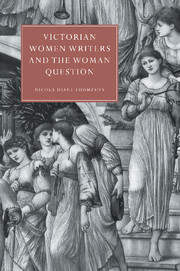Book contents
- Frontmatter
- Contents
- List of illustrations
- Notes on contributors
- 1 Responding to the woman questions: rereading noncanonical Victorian women novelists
- 2 Marriage and the antifeminist woman novelist
- 3 Breaking apart: the early Victorian divorce novel
- 4 Phantasies of matriarchy in Victorian children's literature
- 5 Gendered observations: Harriet Martineau and the woman question
- 6 Maximizing Oliphant: begging the question and the politics of satire
- 7 Literary women of the 1850s and Charlotte Mary Yonge's
- 8 Portraits of the artist as a young woman: representations of the female artist in the New Woman fiction of the 1890s
- 9 Lady in green with novel: the gendered economics of the visual arts and mid-Victorian women's writing
- 10 Ouida and the other New Woman
- 11 Organizing women: New Woman writers, New Woman readers, and suffrage feminism
- 12 Shot out of the canon: Mary Ward and the claims of conflicting feminism
- 13 E. Nesbit and the woman question
- 14 “An ‘old-fashioned’ young woman”: Marie Corelli and the New Woman
- CAMBRIDGE STUDIES IN NINETEENTH-CENTURY LITERATURE AND CULTURE
5 - Gendered observations: Harriet Martineau and the woman question
Published online by Cambridge University Press: 01 March 2010
- Frontmatter
- Contents
- List of illustrations
- Notes on contributors
- 1 Responding to the woman questions: rereading noncanonical Victorian women novelists
- 2 Marriage and the antifeminist woman novelist
- 3 Breaking apart: the early Victorian divorce novel
- 4 Phantasies of matriarchy in Victorian children's literature
- 5 Gendered observations: Harriet Martineau and the woman question
- 6 Maximizing Oliphant: begging the question and the politics of satire
- 7 Literary women of the 1850s and Charlotte Mary Yonge's
- 8 Portraits of the artist as a young woman: representations of the female artist in the New Woman fiction of the 1890s
- 9 Lady in green with novel: the gendered economics of the visual arts and mid-Victorian women's writing
- 10 Ouida and the other New Woman
- 11 Organizing women: New Woman writers, New Woman readers, and suffrage feminism
- 12 Shot out of the canon: Mary Ward and the claims of conflicting feminism
- 13 E. Nesbit and the woman question
- 14 “An ‘old-fashioned’ young woman”: Marie Corelli and the New Woman
- CAMBRIDGE STUDIES IN NINETEENTH-CENTURY LITERATURE AND CULTURE
Summary
The career of Harriet Martineau is difficult to place in a feminist narrative of literary history. Although Martineau was a life-long advocate of women's rights, she disapproved of feminists who drew attention to their personal lives in their work. In her Autobiography, Martineau criticizes the feminist who “[violates] all good taste by her obtrusiveness in society … oppressing every body about her by her epicurean selfishness every day, while raising in print an eloquent cry on behalf of the oppressed.” Such selfish feminist activities, Martineau claimed, had the effect of drawing attention to the identity of the writer instead of furthering actions and ideas that would enable women to overcome confining social roles. For this reason, Martineau carefully avoided direct association with the feminist movement, preferring to campaign for women's rights as a behind-the-scenes journalist and power broker.
Because Martineau was less “visible” in pursuing her feminist agenda than activists such as Josephine Butler and Emily Davies, her work has received little attention in recent histories of Victorian feminism. The purpose of this chapter is not to “rescue” Martineau from this obscurity but to interrogate the notion of obscurity itself in the history of nineteenth-century feminism. Focusing on Martineau's early career in the 1820s and 1830s, I argue that she actively sought anonymity and objectivity in her work as a means of distancing her gender and identity from her writing. This enabled her to express a more “objective” perspective on women's issues and to communicate her ideas to a mixed-gender audience.
- Type
- Chapter
- Information
- Victorian Women Writers and the Woman Question , pp. 80 - 98Publisher: Cambridge University PressPrint publication year: 1999
- 4
- Cited by



